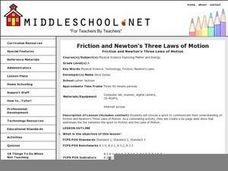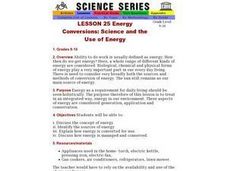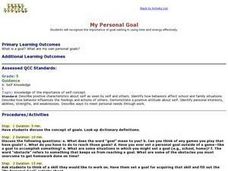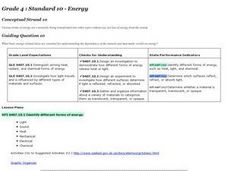Curated OER
Food Chains & Food Webs
Students examine the concepts of food chains and food webs. They trace back common food chains found in nature, demonstrate the interdependence of organisms through a food webbing activity, and analyze the flow of the food chain of a...
Curated OER
Heat and Color
Sixth graders conduct a simple experiment to explore the ways that color can affect heat transfer. They review the three ways that heat can transfer: conduction, convection and radiation.
Curated OER
Are you an Energy Saver STAR?
Young scholars examine how to use energy more efficiently in their own home. They collect data from their home, complete a chart, read a power meter, interpret the data from an electric and gas bill, and create a poster demonstrating how...
Curated OER
Cell Structures and Functions
Fifth graders search into animal and cell characteristics and their functions in this seven lesson unit. Replicas of the cell are constructed out of Jell-O as students probe the internet for details of the concepts.
Curated OER
Friction and Newton's Three Laws of Motion
Students work in small groups to create a power point illustrating Newton's Laws of motion as related to a sport of their choice.
Curated OER
Energy Conversions: Science and the Use of Energy
Students consider the concept of energy and its sources. They study how energy is converted for use and how it is managed and conserved.
Curated OER
My Personal Goal
Fifth graders use goal setting in order to use time and energy efficiently.
Alabama Learning Exchange
Energy
Pupils, using the Internet to research the different types of energy that people use, prepare a slideshow presentation with their research.
Curated OER
Transforming Food Energy: A Balancing Act
Students explain their role as consumers. They use a purchased calorimeter or make their own simple calorimeter to measure the energy content in selected foods. This interesting activity really gets students thinking about what they eat.
Curated OER
Saving Money Through Mathematics
Third graders discuss light sources and collect data about energy sources. They compare data and create a multiple line graph showing energy used by light sources for each student in the group. They present their graphs and write a...
Curated OER
Schools and Cells
Fourth graders create analogies in poster format between a cell's organelles and their school. For example, 4th graders coul say a cell's mitochondria is like the cafeteria, both are a source of energy.
Curated OER
Formation of Fossil Fuels
Young scholars research the origin of oil and natural gas to gather an understanding of the stages of fossil fuel formation. Then the class creates murals depicting the life cycle of a fossil fuel.
Curated OER
Energy
Students see that energy is everywhere in nature - in the light of the sun, in wind, in falling water and erupting volcanoes. Without energy, there is no life. This lesson provides many good ideas across the curriculum to study energy.
Curated OER
Monitoring Energy Expenditure
Students use heart rate monitors and complete a swimming and running test. These tests allow students to obtain personal data, to manipulate the data through calculations of various parameters, and to graphically represent the data.
Curated OER
Energy Concepts - Lesson Plan
Young scholars state the different forms of energy; and observe the effects of energy changing from one form to another (other forms) in electrical appliances.
Curated OER
Radiation: To Worry or Not to Worry
Students distinguish safe forms of radiation from those that are dangerous. Students watch a video about sources of radiation encountered every day. Students estimate their own annual radiation exposure.
Curated OER
Capturing Renewable Energy
Learners watch a video segment on the engineering design process, then design a storage system for renewable energy. Students brainstorm and research ways in which renewable energies such as solar and wind power can be stored.
Curated OER
Making Waves with the Electromagnetic Spectrum
Students explore various types of electromagnetic waves, the range of the spectrum, and common sources of electromagnetic waves.
Curated OER
Energy Production
Students examine the role of energy in our daily lives, and how energy is produced. Students discuss the advantages and disadvantages of each energy resource, and the controversy surrounding the use of nuclear energy.
Curated OER
Capturing Renewable Energy
Young scholars watch a video segment on the engineering design process, then design a storage system for renewable energy. Students brainstorm and research ways in which renewable energies such as solar and wind power can be stored.
Curated OER
Energy Production
Students examine the role of energy in our daily lives, and how energy is produced. Students discuss the advantages and disadvantages of each energy resource, and the controversy surrounding the use of nuclear energy.
Curated OER
Capturing Renewable Energy
Students watch a video segment on the engineering design process, then design a storage system for renewable energy. Students brainstorm and research ways in which renewable energies such as solar and wind power can be stored.
Curated OER
Radiation: To Worry or Not to Worry
Learners distinguish safe forms of radiation from those that are dangerous. Students watch a video about sources of radiation encountered every day. Learners estimate their own annual radiation exposure.
Curated OER
Understanding Light: Lesson 2 - The Electromagnetic Spectrum
Students investigate the Electromagnetic Spectrum and realize there is energy beyond visible light. They identify parts of the EM Spectrum.



















